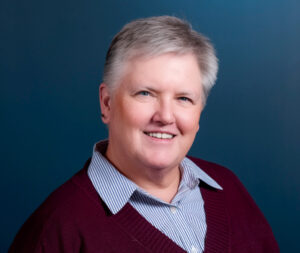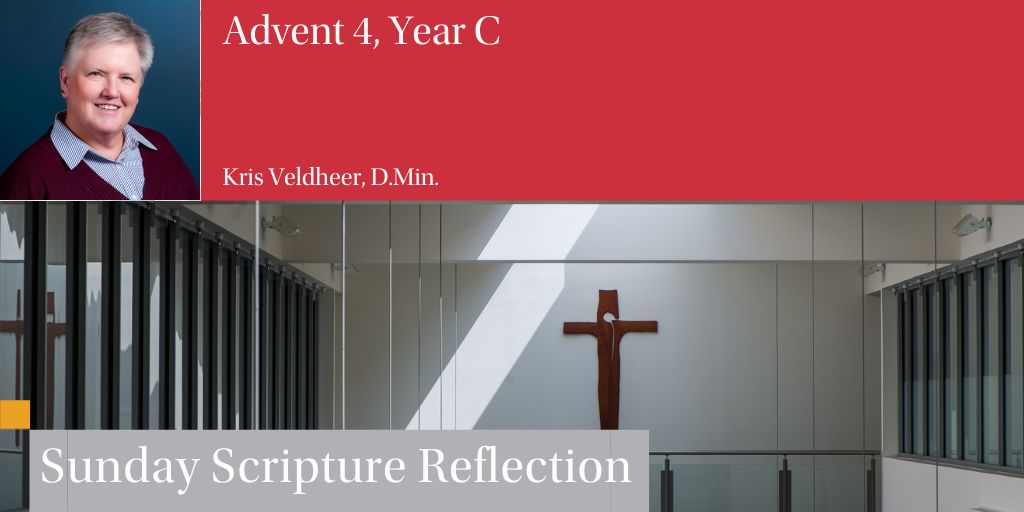
Readings:
Mi 5:1-4a
Ps 80:2-3, 15-16, 18-19.
Heb 10:5-10
Lk 1:39-45
There are contrasts in the liturgical seasons of the church year and these contrasts are worthwhile because they reflect the rhythm of our lives. Advent reflects seasons of our lives that are filled with hope and anticipation. Often, we associate hope and anticipation with happy times like waiting for a loved one to arrive or a baby to be born. But the first Christmas wasn’t exactly happy and but it was filled with hope. On this the last Sunday in Advent, the lectionary readings appointed for today give us anticipation and hope, but they aren’t necessarily filled with happiness.
In the lesson from Micah 5 we hear the anticipation in Micah’s voice as he describes the one who is coming, naming his attributes and saying he will shepherd his flock and “be” peace. To “be peace” is a profound invitation to embody compassion that radiates outward to others and the world. It goes beyond simply seeking peace or desiring it. Instead, it involves becoming a living expression of peace through our thoughts, actions, and presence. How are you doing at being peace so far during Advent? In our turbulent times, peace can be a rare thing indeed, yet Micah reminds us that the one who is to come stands firm to shepherd the flock whose greatness will reach the ends of the earth. These words might remind us to take a breath during Advent and remember to have compassion both for ourselves and others because compassion can be in short supply when we get caught up in the anticipation of the Christmas season. Advent speaks of awaiting God’s help in the midst of desperation, reminding us that we can find echoes of Advent as clearly in the homeless shelter as in the maternity ward and in many other places sorely in need of compassion.
Advent calls to us in the midst of the weight on our shoulders, and it speaks hope. As we watch the news and see the pain in the world, we are faced with our own powerlessness. For those who live in northern climates, snow and ice and cold weigh down the landscape, and we too feel weighed down by our ever-expanding holiday to-do lists, the suffering we see in the world, and by our own personal struggles. Advent is here to remind us that we cannot save ourselves, but yet there is still hope.
Today the fourth candle has been lit in our journey through this Advent season. We hear the story of Mary’s journey to her cousin Elizabeth in our Gospel reading. Mary, the unwed mother and fiancé of a poor carpenter who knows the depths of desperation and powerlessness but still sang to God who was about to save the whole world. The intimate conversation between these two women portraying Jesus as more important than John. There is the fulfillment of prophecy about he who is to come. Again, that sense of anticipation and hope streams from the reading. We may often think of Mary as gentle and meek, but today, Mary is brave and bold, singing loud and strong. Everything is about to change, even the very shape of human history.
In Luke’s Gospel, hope is more than mere optimism. A lot of hope can shake the foundations of everything that weighs us down. A lot of hope can change the course of history. When Luke’s Gospel first introduces us to Mary, she is more like the traditional image of Mary, the young and meek woman who is ultimately faithful. As she is still trying to absorb the news from the angel Gabriel and finds out Elizabeth is also pregnant in her old age, which is another miracle, Mary might want to be near someone who understands and won’t think she is crazy. Here, with another human being who understands that God works in odd and unexpected, but direct ways, which gives Mary the courage to sing her song of hope.
Mary invites us into the vulnerable territory of daring to hope big at the end of Advent. Anticipation of what is to come requires us to have the optimism to look behind us to find comfort in what we have experienced before. The big hope that Mary sings about looks ahead knowing that we cannot imagine what God is able to do. Mary invites us to seek out others in order to find our song of hope. Remember, it wasn’t until Mary was with Elizabeth that her hope burst into song. Maybe, whether we know it or not, we are still doing that today when we seek one another out to gather together to sing our own songs of hope. The best part of Mary’s visit to Elizabeth is that Mary learns that her song of hope is a hope that is never unfulfilled. Every year, even in the darkest times, we remember their visit nearing the end of the Advent season and are reminded that God has already broken through. Even in the darkness when the world looks most broken, we keep this crazy hope alive that God has, and God will break through again. Today, we make haste to find each other to sing that hope and to fan that spark into flame again.
An Advent of hope and anticipation might not always be happy, but at the end of Advent, Jesus always gets born. We long, hope, wait, anticipate, and we are never let down at the last minute. Every year, Christmas always arrives, even if we are exhausted or brokenhearted, and the Light of Christ always comes to the church. The final candle is always lit. Advent and Christmas are here to remind us that God has already broken through into our world. Despite the world’s pain, the dawn is well on the way. And that is why Mary goes to find Elizabeth and sings her heart out. As the season of Advent draws to a close, let each of us find one another and sing our hearts out to God who continues to break through, who sustains our lives, and who always dares us to hope big.
Kris Veldheer, D.Min.
